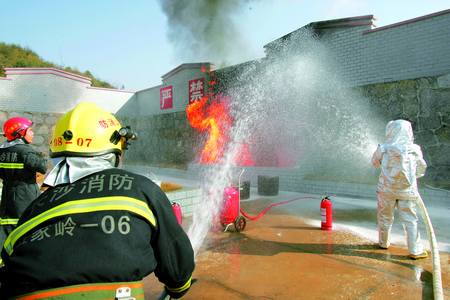| Home / Environment / Public Endeavor | Tools: Save | Print | E-mail | Most Read |
| Lack of Awareness of Emergency Measures |
| Adjust font size: |
The establishment of the Chinese emergency rescue system requires to "walk on two legs," said Zheng Jingchen, a leader with the China International Rescue Team while attending the founding ceremony of the Red Cross Emergency Rescue Team of Hebei Province on December 25 in Shijiazhuang, the province capital. The "two legs" refers to simultaneously establishing professional emergency rescue teams and publicizing emergency rescue knowledge among citizens, Zheng explained.
Firefighters extinguish a fire involving supposed dangerous chemicals in a rescue drill held in Changsha, capital city of central China's Hunan Province, on December 22. According to Zheng, the China International Emergency Rescue Team, founded in April 2001, was ranked among world class ones in terms of its high quality personnel, technical abilities and search and rescue capabilities. Since 2003 the team has completed nine big domestic and international rescue actions including the Indian Ocean Tsunami in December 2004. Wang Zhenyao, director of the Disaster Relief Department under the Ministry of Civil Affairs, said that through the Indian Ocean Tsunami the government had understood the importance of the emergency response system and was making efforts to improve its disaster-relief capability. However, Chinese officials were concerned that citizens weren't at the same standard of awareness of emergency rescue and knowledge of self-preservation. For instance, with hotel fires, the number of foreign tourists who succeeded in escaping was usually much larger than that of Chinese guests. "The main reason is that foreign tourists have the habit of looking for emergency exits as soon as they check in while few Chinese have such awareness," Zheng said. Speed of response after an accident or disaster was essential, said Zheng. "But professional teams usually can't reach the site immediately. People must have the most basic self and mutual-preservation knowledge," said Zheng. Zhao Zhengang, an official from the Red Cross Society of China, said that his group had its own priorities in contacting the public. "Besides establishing emergency rescue teams and training professional personnel, the Red Cross Society shoulders heavy responsibilities of publicizing emergency rescue knowledge and measures," Zhao said. Zhao explained that the Society set up its own emergency rescue team on September 8 this year. Hebei Province took the lead in establishing emergency rescue teams in 11 cities to make it easier for rescue workers to reach incidents quickly. Zhang Shuqin, deputy director of the Hebei Provincial Red Cross Society, said that they would train professionals for the most basic jobs like driving but also give instruction on life saving techniques and nursing. So far, the Red Cross Society of China has developed a First Aid policy in the country's 24 provinces, autonomous regions and municipalities. Its First Aid System project has gradually been expanding. There are some 2,000 shopping malls, gymnasiums and business centers equipped with Red Cross First Aid facilities throughout the country, according to the Society's statistics. (China.org.cn by Li Jingrong, December 28, 2006) |
| Tools: Save | Print | E-mail | Most Read |
 |
| Related Stories |
